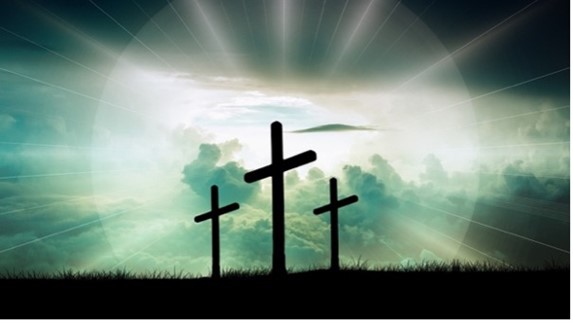Redemption from sin, power to live a new life
The conclusion of the Kigali Commitment (2023) says:
“We commit ourselves afresh to the gospel mission of proclaiming the crucified, risen and ascended Christ, calling on all to acknowledge him as Lord in repentance and faith, and living out a joyful, faithful obedience to his Word in all areas of our lives."
At Easter churches all over the world proclaim the death of Christ. The weakness, humiliation and punishment of the man from Galilee is not hidden or covered up, but lifted up, his suffering remembered in Scripture and liturgy, explained in sermons and sung in hymns. And in churches which faithfully proclaim the gospel, the message of the cross is made universal and personalised: Jesus, God incarnate, willingly gave up his life as a ransom for many; Jesus the lamb of God was slain for the sins of the world; Jesus died for me.
Then, on Easter Sunday, the church proclaims the resurrection. The tomb is empty, there is no dead body, “he is not here, he is risen!” Death is swallowed up in victory. Sin is nailed to the cross and the powers of evil are disarmed, while the risen Jesus is publicly acclaimed in triumphal procession. The slain Lamb is now on the throne. And again, the gospel message applies this and insists: new life, life in fellowship with God which lasts forever, is available to you, to me. Fear of death is gone, since those who believe and who feed on the bread of life are raised with Jesus and will never die.
The Gafcon commitment unites Anglicans who believe that Easter, interpreted this way, is at the heart of our faith. Our sinful nature and our daily sinful thoughts and acts separate us from the God who created us; without a relationship with him we are lost and face judgement and condemnation. But because Jesus died on Good Friday, the judgement and death which we deserved fell on him, and the curtain separating God and humanity was torn open. Because of the cross, we have forgiveness, and access to the holy place where the Father calls us. Because of the resurrection, we can engage with the world with joy and hope, knowing for certain that Jesus, our Saviour and shepherd, is the triumphant Lord over all things, even death.

This is the good news of grace. While we were still sinners, Christ died for us; through the gospel, God justifies the wicked. There is no-one who is righteous, not even one, but we can be filled with the fruit of righteousness which comes through Christ Jesus, to those who turn away from their sins, turn to Christ for forgiveness and receive the gift of the Holy Spirit; who declare that Jesus is Lord and believe that God raised him from the dead.
It is a privilege and a challenge for the church to celebrate these truths especially at Easter, and to proclaim this message throughout the year. A privilege, because like those early apostles, unqualified in human terms, we have received a treasure of inestimable value, a pearl of great price; we have been appointed ambassadors by the King of kings to represent him, with his resources behind us. And a challenge, because we first need to repent of our own sin, and then take this message to a world that is indifferent and sometimes hostile, as lambs among wolves.
Even in the church, especially the more established denominations of the West, many leaders no longer believe in and teach the biblical doctrines of the substitutionary sacrifice of Christ for our sin, the need for all to repent and turn to him (including those of other religions, the poor and the unhappy), and the final judgement. The Anglican disputes about sexuality are a symptom of a wider crisis of unbelief, of not taking God at his word, of not believing the biblical diagnosis of the human condition, and of inventing different ‘gospels’ which dress the wound of God’s people as if it were not serious, and promote ‘peace’ through secular forms of psychology and conflict resolution, attempting to signal virtue through good works when there is no peace with God.
We thank God for the leaders of Gafcon who have shown clarity and courage in identifying these expressions of false ‘gospels’, and also for the way they are providing a diverse, global expression of faithful Anglicanism which can unite around the saving Good News that we celebrate at Easter. And we can pray together for effective communication of the gospel all over the world, especially in those places where to celebrate Easter publicly can lead to persecution.

The quotation from the Kigali Statement about gospel mission does not end with correct understanding, praise filled gratitude and effective communication. It talks about its necessary effect on all followers of Christ: a life of “joyful, faithful obedience”. How is this possible in ways that overcome the realities of sin and suffering, while at the same time don’t allow a gospel of works, a message of “how good I am!” to creep in?
The apostle Paul contrasts his former life, of pride in his human identity and achievements, with his gospel-shaped understanding: that it’s how he is seen and accepted by God that matters – and that is through “the righteousness that comes from God on the basis of faith”. He goes on:
"I want to know Christ – yes, to know the power of his resurrection and participation in his sufferings, becoming like him in his death, and so, somehow, attaining to the resurrection from the dead." Philippians 3:10-11
His primary goal is then “to know Christ”, no longer an agenda set by the world or his sinful nature. Is this a kind of religious quest on a higher plane, separate from engagement from the real world? Not at all, because for Paul, knowing Christ means “participation in his sufferings”. It means living, caring, serving as Christ did, involved in the mess of humanity which Christ came to save, even facing persecution. But we can’t do this in our own strength any more than we can save ourselves and know Christ by our efforts. It is, as the popular song reminds us, “not I, but through Christ in me”.
So Paul puts the experience of the resurrection’s power before the sharing in the suffering. Yes, the gospel message and the pattern of the Christian life is death and resurrection. But we are unable to repent of sin and put it to death; to put Christ first and live a life of service, unless we have the power first! Thanks be to God:
"that you may know …his incomparably great power for us who believe. That power is the same as the mighty strength he exerted when he raised Christ from the dead…" Ephesians 1:18-20
May the Lord bless us all richly this Easter as we continue to know Christ and make him known!